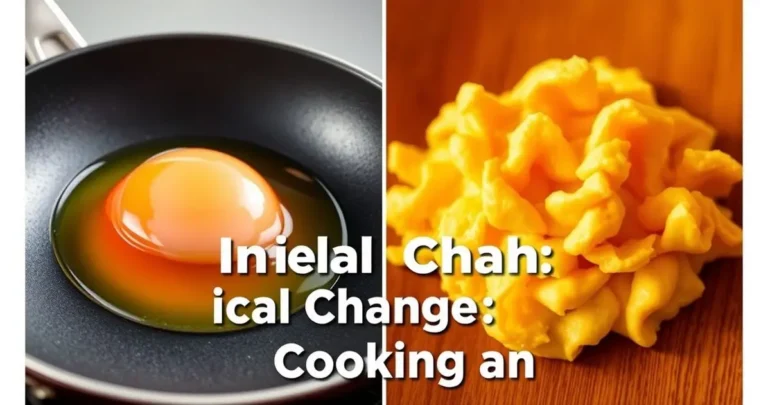Cooking spray, often seen as a convenient kitchen staple, can have negative effects on health due to its chemical additives and unhealthy fats. Understanding these risks can help make better food choices.
Why cooking spray is bad for you

While cooking spray may seem like a healthier alternative to butter or oil, it often contains unhealthy additives and propellants that can be detrimental to health. Exploring its ingredients reveals potential health risks including weight gain and heart problems.
Harmful Additives in Cooking Sprays
Harmful additives in cooking sprays are a significant concern for health-conscious consumers. While these sprays are convenient for non-stick cooking, many contain ingredients that can pose health risks. Here’s a closer look at some of the harmful additives commonly found in cooking sprays:
1. Propellants: Many cooking sprays use propellants to dispense the oil, which can be harmful when inhaled or ingested:
- Butane: This common propellant is used to create pressure in aerosol cans. While it helps to spray the oil, butane is not intended for consumption and can lead to respiratory issues if inhaled.
- Propane: Similar to butane, propane is another propellant that can pose health risks. Inhaling propane can cause dizziness, headaches, and other respiratory problems.
2. Artificial Ingredients: Many cooking sprays contain artificial flavors, colors, and preservatives that can have negative health effects:
- Artificial Flavors: These synthetic compounds can trigger allergic reactions in sensitive individuals and may contribute to inflammation in the body.
- Preservatives: Chemicals like BHT (butylated hydroxytoluene) and BHA (butylated hydroxyanisole) are often added to extend shelf life. These preservatives have been linked to potential health risks, including hormone disruption and increased cancer risk.
3. Unhealthy Fats: Some cooking sprays may contain partially hydrogenated oils, which introduce trans fats into your diet:
- Trans Fats: These unhealthy fats are associated with an increased risk of heart disease, elevated cholesterol levels, and inflammation. Regular consumption of trans fats can have serious long-term health consequences.
4. Lack of Nutritional Value: Unlike natural oils, cooking sprays often lack essential nutrients:
- Empty Calories: Cooking sprays may provide minimal calories without any nutritional benefits. This can lead to increased caloric intake without contributing to a balanced diet.
In summary, harmful additives in cooking sprays, including propellants, artificial ingredients, unhealthy fats, and the lack of nutritional value, pose significant health risks. Being aware of these additives can help consumers make informed choices about their cooking practices and encourage the use of healthier alternatives, such as natural oils or high-quality non-stick cookware.
Impact of Unhealthy Fats on Health
The impact of unhealthy fats on health is a critical concern for consumers looking to maintain a balanced diet and promote overall well-being. Unhealthy fats, particularly trans fats and excessive saturated fats, can lead to various health issues. Here’s an overview of how these fats affect health:
1. Increased Risk of Heart Disease: One of the most significant impacts of unhealthy fats is their contribution to heart disease:
- Trans Fats: Trans fats, commonly found in partially hydrogenated oils, can raise levels of low-density lipoprotein (LDL) cholesterol, often referred to as “bad” cholesterol. Elevated LDL levels increase the risk of plaque buildup in arteries, leading to heart disease and stroke.
- Saturated Fats: While not all saturated fats are harmful, excessive consumption can also raise LDL cholesterol levels. Foods high in saturated fats, such as fatty cuts of meat and full-fat dairy products, should be consumed in moderation.
2. Inflammation: Unhealthy fats can contribute to chronic inflammation in the body, which is linked to various health conditions:
- Chronic Diseases: Inflammation is associated with chronic diseases such as diabetes, arthritis, and certain cancers. Diets high in trans fats and omega-6 fatty acids can exacerbate inflammatory responses.
3. Weight Gain and Obesity: Unhealthy fats are calorie-dense, and diets high in these fats can contribute to weight gain:
- Caloric Surplus: Consuming excessive amounts of unhealthy fats can lead to a caloric surplus, resulting in weight gain and obesity, which are risk factors for numerous health issues.
4. Impact on Mental Health: Emerging research suggests that unhealthy fats may also affect mental health:
- Link to Depression: Diets high in trans fats and low in healthy fats have been linked to an increased risk of depression and anxiety. Healthy fats, such as omega-3 fatty acids found in fish, are important for brain health.
5. Recommendations for Healthier Fats: To mitigate the impact of unhealthy fats, it is essential to focus on healthier alternatives:
- Monounsaturated and Polyunsaturated Fats: Incorporate sources of healthy fats, such as olive oil, avocado, nuts, and fatty fish, which can help improve heart health and reduce inflammation.
- Avoid Trans Fats: Read food labels carefully and avoid products containing partially hydrogenated oils to minimize trans fat intake.
In summary, the impact of unhealthy fats on health is significant, contributing to heart disease, inflammation, weight gain, and mental health issues. By making informed choices about dietary fats and prioritizing healthier options, individuals can promote better health and reduce the risk of chronic diseases.

Inflammation and Digestive Issues Linked to Cooking Spray
Inflammation and digestive issues linked to cooking spray are important considerations for health-conscious consumers. While cooking sprays offer convenience, their ingredients can sometimes lead to adverse health effects. Here’s a closer look at how cooking sprays can contribute to inflammation and digestive problems:
1. Harmful Additives: Many commercial cooking sprays contain artificial ingredients, preservatives, and propellants that can irritate the digestive system:
- Artificial Ingredients: Ingredients such as artificial flavors and preservatives may provoke allergic reactions or sensitivities in some individuals, leading to digestive discomfort.
- Propellants: The propellants used in aerosol cooking sprays, such as butane and propane, are not intended for consumption and can cause gastrointestinal irritation if ingested in significant amounts.
2. Trans Fats and Inflammation: Some cooking sprays may contain partially hydrogenated oils, which introduce trans fats into the diet:
- Inflammatory Response: Trans fats have been linked to increased inflammation in the body, contributing to chronic health conditions such as heart disease and arthritis. This inflammatory response can also manifest as digestive issues, such as bloating and discomfort.
3. Gut Health Implications: The consumption of cooking sprays with unhealthy fats and additives can negatively impact gut health:
- Microbiome Disruption: Diets high in processed foods and unhealthy fats can disrupt the balance of gut bacteria, leading to digestive problems and inflammation.
- Increased Risk of Digestive Disorders: Regular consumption of unhealthy fats may contribute to the development of conditions like irritable bowel syndrome (IBS) and other gastrointestinal disorders.
4. Recommendations for Healthier Cooking Practices: To minimize the risk of inflammation and digestive issues, consider the following alternatives:
- Use Natural Oils: Opt for natural cooking oils, such as olive oil or avocado oil, which are free from harmful additives and provide healthy fats.
- Choose Non-Stick Cookware: Invest in high-quality non-stick cookware that eliminates the need for cooking sprays, allowing you to cook with less oil while achieving non-stick results.
In summary, the potential for inflammation and digestive issues linked to cooking spray highlights the importance of being mindful of the ingredients in your cooking tools. By opting for healthier alternatives and avoiding products with harmful additives, you can promote better digestive health and overall well-being in your cooking practices.
Healthier Alternatives for Non-Stick Cooking
Finding healthier alternatives for non-stick cooking is essential for those who want to avoid the potential risks associated with traditional cooking sprays and non-stick coatings. Here are some effective and safe options to consider:
1. Natural Oils: Using natural oils is one of the best alternatives to cooking sprays:
- Olive Oil: Extra virgin olive oil is rich in monounsaturated fats and antioxidants. It can be used for sautéing, roasting, and drizzling over dishes for added flavor.
- Avocado Oil: With a high smoke point and a mild flavor, avocado oil is perfect for high-heat cooking methods such as frying and grilling, making it a versatile choice.
- Coconut Oil: Coconut oil adds a unique flavor and is suitable for medium-heat cooking. It contains medium-chain triglycerides (MCTs) that may offer health benefits.
2. Non-Stick Cookware: Investing in high-quality non-stick cookware can eliminate the need for cooking sprays altogether:
- Cast Iron Pans: When properly seasoned, cast iron pans develop a natural non-stick surface that enhances flavor and can be used for various cooking methods.
- Ceramic Cookware: Ceramic-coated pans are free from harmful chemicals and provide a non-stick surface without the risks associated with traditional non-stick coatings.
- Stainless Steel: While not inherently non-stick, stainless steel pans can be used effectively with proper techniques, such as preheating and using sufficient oil, to prevent sticking.
3. Silicone Baking Mats: For baking, silicone baking mats provide a non-stick surface that eliminates the need for cooking sprays:
- Reusable and Durable: Silicone mats are reusable, easy to clean, and can withstand high temperatures, making them an eco-friendly alternative to parchment paper.
4. Cooking Techniques: Adjusting your cooking techniques can also help reduce the need for non-stick sprays:
- Proper Preheating: Preheating your pans before adding food can help create a natural non-stick effect, especially with stainless steel cookware.
- Using the Right Amount of Oil: Using enough oil or fat can help prevent sticking while enhancing flavor without relying on sprays.
In summary, healthier alternatives for non-stick cooking include using natural oils, investing in quality non-stick cookware, utilizing silicone baking mats, and adjusting cooking techniques. By choosing these options, you can create delicious meals while prioritizing your health and safety in the kitchen.
Conclusion
In conclusion, opting for healthier alternatives for non-stick cooking is essential for promoting a safe and nutritious cooking environment.
By choosing natural oils such as olive oil, avocado oil, and coconut oil, you can enhance the flavor of your dishes while avoiding the harmful additives found in traditional cooking sprays.
Investing in quality non-stick cookware, such as cast iron and ceramic-coated pans, provides effective cooking solutions without compromising health.
Additionally, utilizing silicone baking mats and adjusting your cooking techniques can further reduce the need for non-stick sprays.
Ultimately, making informed choices about the cooking tools and ingredients you use can lead to a healthier lifestyle.
By embracing these alternatives, you can enjoy delicious meals while prioritizing your well-being and contributing to a more sustainable kitchen environment.
FAQ – Frequently Asked Questions about Non-Stick Cooking Alternatives
What are some healthy alternatives to cooking sprays?
Healthy alternatives include natural oils like olive oil, avocado oil, and coconut oil, as well as high-quality non-stick cookware like cast iron and ceramic.
Why should I avoid traditional cooking sprays?
Traditional cooking sprays may contain harmful additives and unhealthy fats, which can pose health risks when consumed regularly.
How can I make stainless steel cookware non-stick?
To make stainless steel cookware non-stick, preheat the pan properly and use enough oil to create a barrier between the food and the pan’s surface.
What are the benefits of using silicone baking mats?
Silicone baking mats provide a reusable non-stick surface, are easy to clean, and can withstand high temperatures, making them an eco-friendly alternative.
Are ceramic-coated pans safe to use?
Yes, ceramic-coated pans are generally considered safe as they are free from harmful chemicals like PFOA and PTFE, but it’s important to follow care instructions to maintain their non-stick properties.
How can I reduce sticking when cooking with cast iron?
To reduce sticking with cast iron, ensure the pan is well-seasoned, preheat it properly, and use sufficient oil when cooking.
See more
Discover plenty of easy and delicious recipes you can make at home, from hearty dinners to indulgent desserts and wholesome breakfasts.




